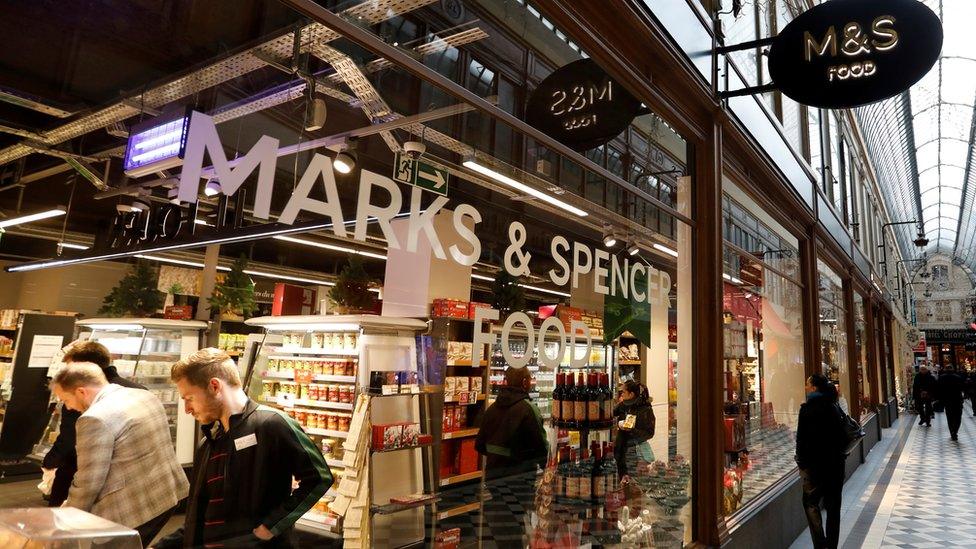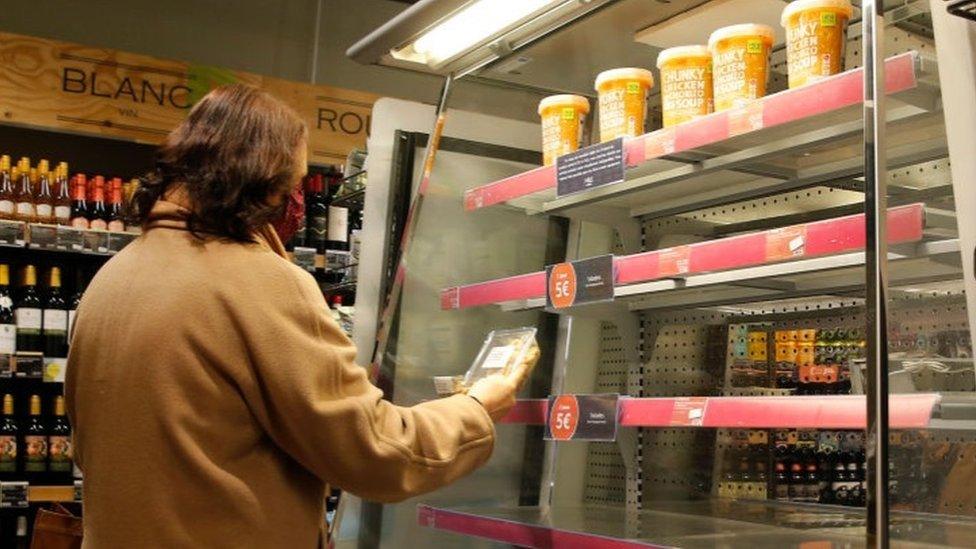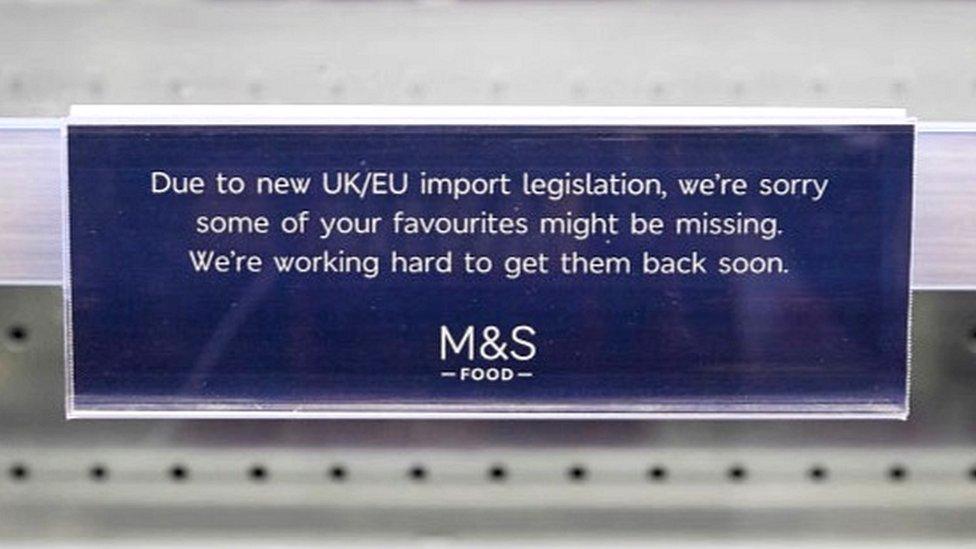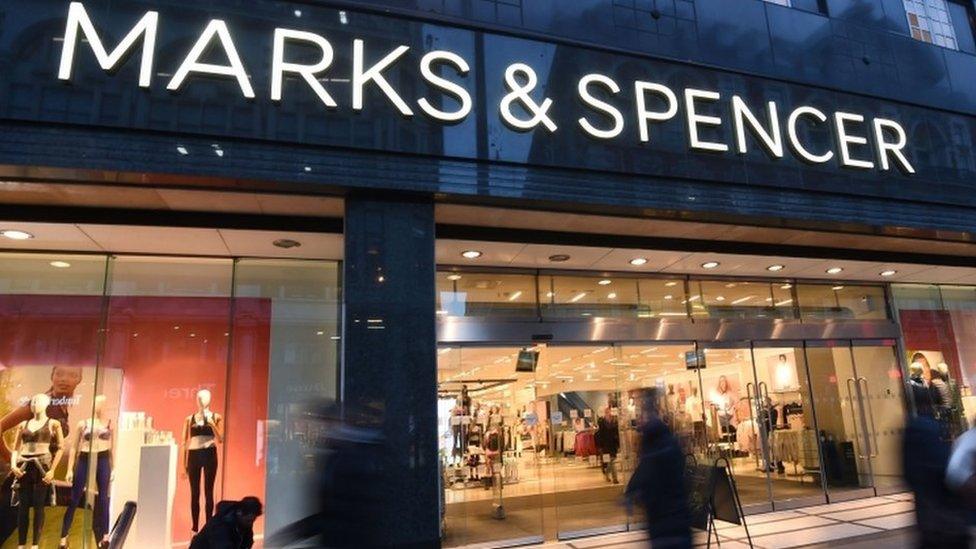Marks & Spencer blames Brexit as it closes 11 French stores
- Published
- comments

Marks & Spencer has said it is closing 11 of its French stores because of problems supplying them with fresh and chilled foods since Brexit.
The UK retail giant said all 11 franchise stores it operated with partner SFH in France would shut by the end of this year.
M&S said supply chain problems since Brexit had made it "near impossible" to maintain standards of food supply.
Nine M&S stores run at French travel hubs will continue to operate.
"M&S has a long history of serving customers in France and this is not a decision we or our partner SFH have taken lightly," said Paul Friston, M&S managing director of international.
"However, as things stand today, the supply chain complexities in place following the UK's exit from the European Union now make it near impossible for us to serve fresh and chilled products to customers to the high standards they expect, resulting in an ongoing impact to the performance of our business.
"With no workable alternative for the High Street stores, we have agreed with SFH to close all 11 franchised stores."
Its French online operation, which sells mainly clothing and home products, will not be affected by the closures.

Red tape
One of the main problems Marks & Spencer was facing in France was post-Brexit bureaucracy, a spokesman said.
Its partner, SFH, mainly operated shops on Paris High Streets, selling fresh food products such as sandwiches, he said.
Due to hold-ups caused by red tape at the UK/French border, it was impractical to get the products to the shops.
The retailer's other French partner, Lagardere Travel Retail, runs M&S stores in French airports, railway and Metro stations.
Those stores are unaffected by this decision, in part because of their location.
Marks & Spencer opened its first French stores in 1975, with branches in Paris and Lyon.
After leaving France and the rest of mainland Europe in 2001 to focus on its UK business, it then reopened in Paris in 2011.

Czech changes
M&S said its discussions with Lagardere on a sustainable future business model continued to make good progress.
"Today's announcement is the latest change to the structure of our European businesses following the UK's exit from the European Union," the retailer said.
"In April earlier this year, we announced the reconfiguration of our food business in Czech Republic, removing the sale of all fresh and chilled products from stores, and instead doubling our ranges of frozen and ambient products.
"This removed the ongoing supply chain risks to our business and the knock-on impact on limiting availability for customers in our stores."


The export of fresh processed food from the UK to the EU is a classic example of precisely the sort of trade, built up under the single market, that was bound to be challenged by the new post-Brexit arrangements.
Specialist exporters say hundreds of pages of documents including health certificates are now required.
Although catastrophic port delays were avoided in the immediate aftermath of Brexit earlier this year, the trade data and surveys of small businesses reveal a hit to exports to the EU.
Giants such as M&S were able to muddle through, but no longer.
Some exporters have also complained that imports coming the other way from the EU will be waved through now until July at least.
There had been some hope that imposing UK import controls would provide an incentive for France, the Netherlands and Germany to ease controls on their side.
That discussion is not now happening. Nor is there any move towards a veterinary agreement, of the sort the EU already enjoys with Switzerland or New Zealand, that might have eased some of the new export red tape burden.
Instead, there is a private acceptance that after this Brexit deal, fewer sandwiches will be exported to France, and that is the price for the regulatory and trade freedom to export more elsewhere.

Brexit effects
Steve Dresser, managing director of Grocery Insight, said that while all retailers' sales had been affected by Covid, Marks & Spencer in France was "another casualty of Brexit".
"Once you add inefficiency in to any supply chain, be it trade barriers or bureaucracy, plus the need for extra manpower, there is cost that needs to be absorbed somewhere along the line.
"It's likely for the minimal returns, the numbers simply no longer made sense to M&S," Mr Dresser said.
"It's clear that a huge amount of management resource has been taken up getting stock in the right place for European stores," he added.
This include the Republic of Ireland, where Marks & Spencer has had stock shortages, "due to the way that product is accounted for coming via Northern Ireland". Products entering either Northern Ireland or the Republic of Ireland from Britain are subject to EU border processes.
Retailers have been dealing with stock shortages and stock being held up at borders post-Brexit, as well as a chronic shortage of drivers, which hauliers have said is in part due to Brexit.
Businesses are faced with costs, either through having to pay for warehouses in EU countries and having cash tied up in stock, through wastage if products with a short shelf life are held up at borders, or through gaps on shelves due to supply chain problems.
"The outlook remains bleak on this front, with the deal signed by UK government tying this country to checks and delays at the borders," Mr Dresser said, adding that this was "baffling" as "we have voted to take back control".
Related topics
- Published6 September 2021

- Published29 August 2021
